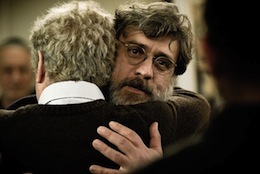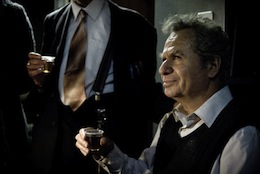 The Academy Awards always bring additional interest to lesser known or foreign nominees. Footnote, a nominee from Israel for Best Foreign Language Film of 2011, finally gets released here in the central U.S.
The Academy Awards always bring additional interest to lesser known or foreign nominees. Footnote, a nominee from Israel for Best Foreign Language Film of 2011, finally gets released here in the central U.S.
Though it wasn’t produced in the United States, it’s subject matter and ability to shape a tale that is both magical and believable resonates with other films from 2011 such as Beginners or Midnight in Paris.
Footnote is the story of an unhealthy rivalry between a father and a son. Eliezer Shkolnik (Shlomo Bar-Aba) and his son, Uriel (Lior Ashkenazi), are both professors in the study of the Talmud, the central religious texts of Judiasm, but whereas Eliezer, because of his strict scientific methodology as well as his gruff and unreasonable demeanor, has always been shunned from the mainstream academy, Uriel has been lauded for his colloquial and quaint Talmudic observations.
 Their rivalry comes to a head when Eliezer is mistakenly award the prestigious Israel Prize, when in fact Uriel should have won the honor. Both men are put in awkward positions as the nature of the situation comes to light, and it strains their relationship to the breaking point.
Their rivalry comes to a head when Eliezer is mistakenly award the prestigious Israel Prize, when in fact Uriel should have won the honor. Both men are put in awkward positions as the nature of the situation comes to light, and it strains their relationship to the breaking point.
Both Bar-Aba and Ashkenazi are top notch in their respective roles. Ashkenazi plays Uriel in such a way as to make real his deep seeded resentment for his father’s past wrongs while maintaining a childlike adoration for him as well.
 Rarely will you see arrogant, stubborn and emotionally cruel played with the amount of insecurity, vulnerability and sympathy that Bar-Aba is able to bring to the role of Eliezer. His sensitivity to the smallest of emotional shifts in his character comes through in a stunning performance.
Rarely will you see arrogant, stubborn and emotionally cruel played with the amount of insecurity, vulnerability and sympathy that Bar-Aba is able to bring to the role of Eliezer. His sensitivity to the smallest of emotional shifts in his character comes through in a stunning performance.
Making a film about academic study, reading, writing is very difficult. Films such as Wonderboys, Capote, even Moneyball all struggle with varying degrees of success to translate the internal mental workings of their characters into strong visual images. The stories can become either stale and sessile or unduly frenetic and forced.
 Director Joseph Cedar does a fantastic job of making his story visual. From his use of metaphoric cutaways to his chapter breaks and transitional elements to his intense and thoughtful closeups, Cedar is able to put us in Uriel’s and Eliezer’s mental spaces. With only slight gestures and subtle repetition, Cedar unlocks a vast store of love and animosity between a father and son.
Director Joseph Cedar does a fantastic job of making his story visual. From his use of metaphoric cutaways to his chapter breaks and transitional elements to his intense and thoughtful closeups, Cedar is able to put us in Uriel’s and Eliezer’s mental spaces. With only slight gestures and subtle repetition, Cedar unlocks a vast store of love and animosity between a father and son.
At one point there are speculations of a hidden affair, but it is handled with such deftness that if one were to look away at the wrong time, they may never catch the single moment that establishes it. This is not a flaw however, but a comment on the multi-layered nature of the film and the light-handedness of Cedar.
 The film does trudge along a bit late in the second and at the beginning of the third act, and Cedar’s need to leave the ending open for interpretation may err on the side of total ambiguity, but these are minor gripes leveled at a thoughtful and well-crafted film.
The film does trudge along a bit late in the second and at the beginning of the third act, and Cedar’s need to leave the ending open for interpretation may err on the side of total ambiguity, but these are minor gripes leveled at a thoughtful and well-crafted film.
If ever you’ve struggled with a parent, or as an adult child you have questioned the shifting nature of your relationship with your parent turned peer, then you must see Footnote. It’s funny and dear, and will definitely evoke some interesting emotional exploration.







Comments on this entry are closed.